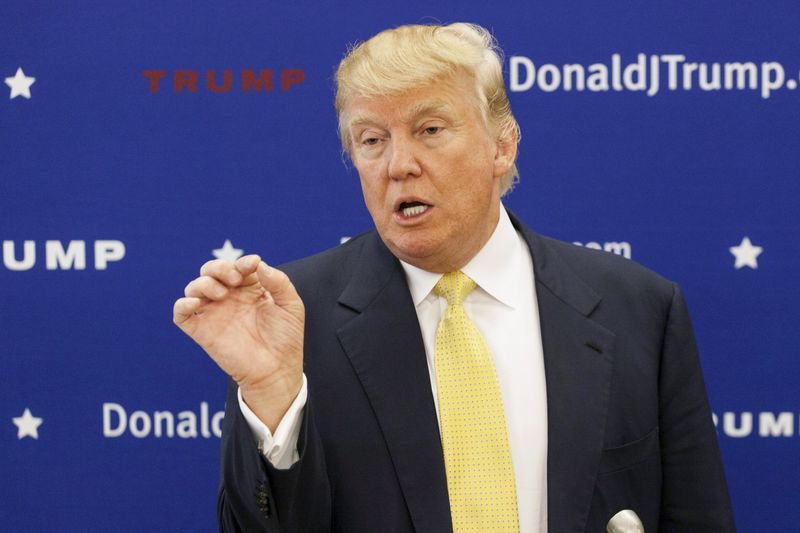(Bloomberg View) -- Recent heresies by Republican Senators Bob Corker, Jeff Flake and John McCain may or may not be important to the future of the world's oldest democracy. They could, for example, make it easier for other Republicans to openly lament President Donald Trump's personal character or professional incompetence. And that could lead to something. Or not.
For now, however, the senatorial protests merely confirm that the jerry-rigged politics of the Trump era is deceptively stable.
Washington has settled into a joint-custody arrangement in which Trump controls the Republican Party's soul and the party's Congressional leaders control its agenda. Either member of the GOP pact can challenge that arrangement at any moment. Neither seems prepared to.
Domestic policy, from the failed repeal of Obamacare to the muddled tax "reform" effort under way, is the purview of Congressional Republicans. When McCain voted thumbs down on his party's health-care plan, he wasn't dashing Trump's legislative agenda—he was reneging on a GOP promise that long preceded Trump's presidential campaign.
On the same morning that the capital was buzzing about Flake's "J'accuse" speech yesterday on the Senate floor, House Ways and Means chairman Kevin Brady casually contradicted Trump's promise that no changes would be made to 401(k) retirement plans in order to pay for tax cuts for corporations and the wealthy.
Had Brady challenged Trump on the president's crusade against black politicians, black athletes, black gold star widows or other aspects of Trump's core cultural competency, all hell might have erupted, punctuated by presidential tweets and snide put-downs from White House press podium.
But Brady was merely contradicting Trump on a key domestic policy plank. The stakes are dramatically lower because Trump cares about that stuff dramatically less, if at all.
Foreign policy is more likely to provoke conflict because the executive's power is so much less constrained, and because Trump's America-first conflict with Republican internationalists is so much more pronounced. But because Trump is largely unfocused and mostly incompetent, the impact is also significantly muted.
Trump's policy opponents, both within his party and within his own administration, remain influential. Trump's bluster on the North American Free Trade Agreement, Iran, a Muslim ban and more has yet to produce major policy victories for the MAGA crowd. Meanwhile, Trump's vocal protectionism has somehow yielded a 24 percent increase in foreign steel imports to the U.S., Bloomberg News reported. Perhaps the most forceful expression of Congressional power was the vote expanding Russian sanctions. Ever faithful to Vladimir Putin, Trump may still be dodging the law he was forced to sign in August. But if he were really in the policy driver's seat, it wouldn't have become an issue in the first place.
Corker has lamented the danger posed by Trump's recklessness and his general unfitness for office. McCain trashed Trump's "blood and soil" nationalism in a speech last week in Philadelphia. But like Flake, Corker and McCain ultimately target the clear and present danger of Trump's character, not of his vague and variable policies.
In return for power over the Republican agenda, Congressional leaders have ceded the party's soul—and base—to Trump. House Speaker Paul Ryan makes the bargain explicit every time he responds to a Trump outrage with a sunny-side-up prognosis about the wonders of tax reform.
The tensions are real and the party may still come undone. But there is no organized GOP effort to blunt Trump's demagogy. There is no resistance even to the embrace of allied demagogues, such as Alabama GOP senate nominee Roy Moore. Beyond a few heretics, Republicans have accepted their political lot.
Trump is a danger both to the party and the nation. Republican leaders know that Corker, Flake and McCain are right to sound the alarm. But Trump keeps the faithful in the pews. And he lets Republicans run Congress. After months of shame and failure, that may not look to be worth much. But it's all they've got. And they're not giving it up anytime soon.
This column does not necessarily reflect the opinion of the editorial board or Bloomberg LP and its owners.
Francis Wilkinson writes editorials on politics and U.S. domestic policy for Bloomberg View. He was executive editor of the Week. He was previously a national affairs writer for Rolling Stone, a communications consultant and a political media strategist.
